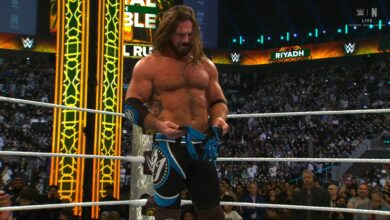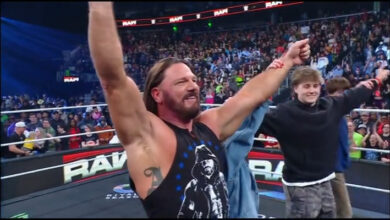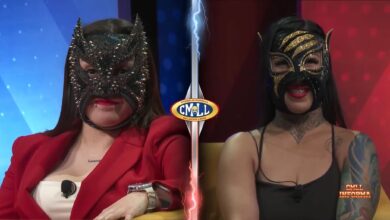Who Is Roderick Strong & What Are Modern Pro Wrestling Characters?
After six months of floating on NXT television, this week the wrestling world’s perception of Roderick Strong changed in around six minutes. For over a decade Strong has been a respected world-class pro wrestler traveling the world, admired by fans and peers. However, for all of his in-ring prowess there has been a slight disconnect with Strong at times, especially when operating as a babyface. Even the most ardent Strong supporters often concede that it’s as an obnoxious villain he has historically most shined. It just always seemed easier for him to portray arrogance and condescension than it did likability and sincerity.
It’s for these reasons that many have found Strong’s NXT run as a babyface somewhat flat thus far. Though his in-ring work has still been highly impressive, the lack of time put into Strong’s character has affected his ability to really connect with the audience on a personal level. This week that all changed though, as we were given some insight into Strong’s back story via part one of a segment entitled “Who is Roderick Strong?” The piece detailed Strong’s troubled upbringing including his parents’ bouts with addiction and his father’s eventual death when Strong was just eight. It was a story that had never been told before.
The story on its own was both absorbing and saddening but the real message from it was more enlightening than any Strong match or promo ever could’ve been. Strong himself concluded that his youth has played a major part in his personality. Admitting that he often viewed showing emotion as weakness, Strong points to that “protective mechanism” as the main reason for his relative “shyness”. That acknowledgment instantly gave Strong’s character depth and intricacy and it wasn’t flashy or extravagant but instead genuine and authentic. Real to a hard-hitting degree. It gave people a reason to truly care about Strong and his motives, something absent far too often in modern professional wrestling.
It achieved all of this while still furthering Strong’s credibility as an athlete too. Though it was very much not the focus, Strong’s accolades as a well traveled performer were spotlighted, as was his long time passion for the industry. By the end of part one it was even clearer that Strong was a skilled and seasoned athlete but more than that, a complex and candid person. He was a real person. Some will relate, others could sympathize but all would respect and admire. Consider everything I just wrote here and then look across the professional wrestling landscape and you’re left wondering something: why is this the exception and not the rule?
To be clear, I definitely don’t want to undermine Strong’s incredible story. There are few in the industry with a story even comparable so of course this isn’t something replicable across the board. Strong’s story is unique to him and that’s why it worked. My point though is why don’t we see them try to take this route more regularly? Everyday NXT talents are being considered for ‘gimmicks’ to get them on television, some interesting, others simple and many silly. There’s absolutely a place for over the top characters and personalities in pro wrestling, in fact I’d say they’re necessary. Pro wrestling is virtually built on over the top imagery and animated mannerisms but behind it all there needs to be some substance.
Tye Dillinger is a good example of this in my mind. At the forefront Tye’s character is that of a man that passionately throws his hands in the air to symbol the number ‘10’ and fortunately, people thoroughly enjoy doing it with him. At heart there’s more to it than that though, people relate to Tye because he’s a genuine underdog story. After his Royal Rumble appearance this year, NXT aired some footage following Dillinger’s experience. It wasn’t anything special and certainly wasn’t as detailed as this Strong piece but it still gave an insight into who Dillinger is and quickly made him dramatically more relatable than 90% of the roster.
It’s one thing to make people laugh or smile but to make them truly care is something very different. Strong’s story is special but there are other recent wrestling examples of real stories connecting with people. The Cruiserweight Classic stands out as a case of this in my mind. With sit-down interviews, the show shined a light on the talent’s real back stories and allowed people to choose their favorites based on who they most naturally connected with. Since arriving on the main roster, some of those same talents have come across uninteresting or un-charismatic but on that show with that format, they were compelling and engaging.
Other instances could be the WWE 24 about Seth Rollins or even more recently the ‘My Daughter is a WWE Superstar’ feature about Alexa Bliss. You could argue that the face/heel aspect of those two characters hindered the potential effect but nonetheless, I maintain that the response to both was telling. Anyone previously unaware of Rollins would’ve fallen in love with his honesty as we followed his frustrating recovery from injury. His desperation to return was palpable and made him all the more endearing. Bliss’ story of overcoming an eating disorder did just the same and though it slightly contrasts with her current disposition, that footage will likely be perfect for the inevitable character shift down the line.
All of these examples show that people care about and respond to real and relatable stories. Larger than life characters are necessary but this is a direction that should be taken more often. Rather than always looking to hand out ‘unique gimmicks’, maybe some characters should be formed from the performer’s own personal back story and experiences. Something actually unique to them. Few stories are likely to be as engrossing as Strong’s but in my opinion pro wrestling has operated on a rigid split and archetype characters for far too long. I will always believe in a clear babyface vs. heel clash but they can still both have elements of good and bad. Real people are complex and with the business constantly changing, some pro wrestling characters should be the same. Don’t believe me? Simply look at Roderick Strong.




